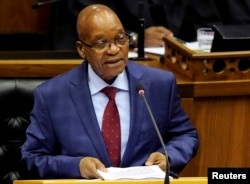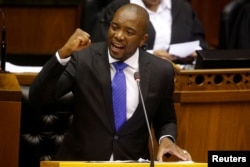South African President Cyril Ramaphosa took full advantage of his captive national audience as he made his second annual address as president before Parliament in Cape Town.
His wide-ranging two-hour State of the Nation speech Thursday night spanned so many topics, in such minute detail, that one local media outlet tried to boil it down to just the major points — and ended up with 17 of them.
Another prominent columnist described Ramaphosa — flatteringly — as a policy "nerd."
But the businessman and longtime political operative had no trouble identifying his priority in a nation where the unemployment rate recently surged past 27 percent.
"Above everything else, we must get our economy working again," he said. "I call upon every South African to make this cause your own. Because when we succeed — and if we do, indeed, as we must — it is the entire nation that will benefit. Now, as government, as business, as labor, as all our citizens, let us unite to embrace tomorrow."
Ramaphosa came to office just ahead of his State of the Nation speech last year, after unpopular former President Jacob Zuma was forced from office over a string of corruption scandals.
Zuma was not among the former presidents who attended Thursday night's speech in Cape Town.
Ramaphosa, who leads the ruling African National Congress party, used his year in office to distinguish — and distance — himself from his predecessor.
Ramaphosa read from an iPad — a stark contrast to Zuma, who often trudged slowly and painfully through stacks of paper while delivering speeches in a halting monotone.
Ramaphosa touched on many issues plaguing South Africa: his aim to support and strengthen ongoing corruption inquiries into Zuma and other top officials; the struggles of the state energy provider, which he announced would be split into three entities; changes in education, health care and public housing; and, in what has become the president's signature, his decision to appoint more committees to explore topics of national importance.
Political analyst Daniel Silke, who spoke to VOA from Cape Town, said he felt the speech was effective — both in policy and politics.
"I think what stood out was the comprehensive nature of the speech," he said. "It had many touchpoints, and I think there was a sense of urgency and commitment that we had not seen before, possibly prompted not only by economic difficulties, but also by the fact that there is an election in May, and this particular state of the nation address really did seem as if it was the launch of Cyril Ramaphosa's campaign for election."
Opposition leader's reaction
And that's where opposition leader Mmusi Maimane, who heads the Democratic Alliance, found fault with it. Maimane, who is also running for president, criticized the typically precise president for being too vague and cautious. His party sent VOA his remarks.
"Yesterday, people heard about plans that should have been implemented 10 years ago," Maimane said. "There should have not been promises about another summit, another directorate. There should have been concrete steps, immediate steps.
"Steps about, how do we ensure that there's a job in every home? How do we make sure that citizens are actually safe in their houses by having honest and professional police? How do we ensure that our borders are secure? And how do we ensure that those who are corrupt, including those who sat in Parliament yesterday clapping for the president, are the ones who are needing to be arrested first? We need change and we need it urgently," he said.
Maimane then accused Ramaphosa of being under the thumb of the ruling African National Congress party, the ANC.
"And therefore, in looking at the State of the Nation address, more must be done, and what will happen is that the ANC still remains in charge, not Mr. Ramaphosa," Maimane said.
Ramaphosa's announcements
The ANC has won every national poll since South Africa became fully democratic in 1994. Although they are expected to do so again this year, in recent elections the ANC has lost ground to the opposition in major town and cities.
To gain back some of the high ground, Ramaphosa announced the resurrection of a special investigative unit focused on corruption. He also pledged, within six years, to provide every schoolchild with a tablet and, within five years, to build a half-million subsidized housing units.
And he slipped in a newsworthy detail that is key to his future, and to South Africa's: The next general election, he declared, will be held May 8.






